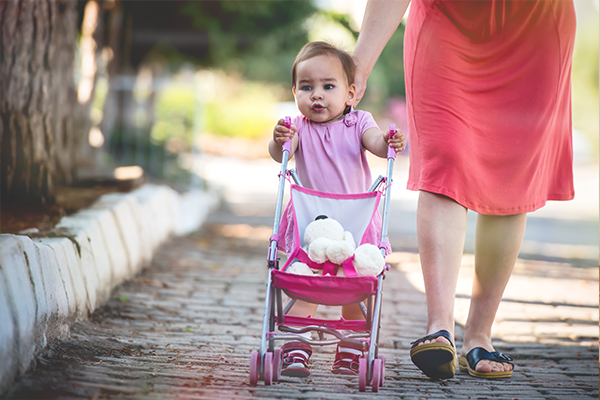
Toddler Milestones: Your Baby’s Development at 1 Year

1 Year Old Toddler Developmental Milestones
After a baby’s first birthday, the rate of growth begins to slow down. Your baby is now a toddler and is very active. If your toddler isn’t walking yet, he or she will soon. Walking offers chances for exploring areas that were previously out of reach, and for practicing independence.
Doctors use milestones to tell if a toddler is developing as expected. There’s a wide range of what’s considered normal, so some children may gain skills earlier or later than others. Toddlers who were born prematurely may reach milestones later. Always talk with your doctor about your child’s progress.
1 Year Old Developmental Areas
What can a 1 Year Old Baby do at this age?
As your baby continues to grow, you will notice new and exciting abilities that develop. While babies may progress at different rates, the following are some of the common milestones your baby may reach in this age group:
- Walks alone by 15 months, then begins to run
- Can stop, squat then stand again
- Sits down on small stool or chair
- Climbs stairs while holding on
- Dances with music
- Plays with push and pull toys
- Can build towers out of blocks
- Throws a ball overhand
- Puts two- to three-piece puzzles together
- Scribbles with crayon or pencil and may imitate drawing a straight line or circle
- Mostly feeds self with fingers
- Begins to feed self with spoon
- Drinks well from cup
- Can help with dressing and may be able to undress simple clothes (i.e., clothes without buttons or zippers)
- First molar (back) teeth appear
- Takes one afternoon nap
- May sleep 10 to 12 hours at night
What Can a 1 Year Old Baby Say?
Speech development is very exciting for parents as they watch their babies become social beings that can interact with others. While every baby develops speech at his or her own rate, the following are some of the common milestones in this age group:
- Imitates animal sounds and noises
- At one year, says four to six simple words
- At 18 months, says 10 to 15 words
- By 18 to 24 months, uses simple phrases or two-word sentences (i.e., “Mommy up”)
- By 2 years, says 100 or more words
- Asks “What is … ?”
- Uses negative phrases such as “No want”
What Does a 1 Year Old Baby Understand?
By about 18 months of age, children begin to understand symbols - the relationship of objects and their meanings. While children may progress at different rates, the following are some of the common milestones children may reach in this age group:
- Waves bye-bye and plays pat-a-cake
- By 18 months understands one-step questions and commands such as “Where is the ball?”
- By 24 months understands two-step questions and commands such as “Go to your room and get your shoes.”
- Understands object permanence (a hidden object is still there)
- Understands the cause-and-effect relationship better
- Likes to explore drawers and boxes to see what is inside
- Make-believe play increases (i.e., may imitate housework or feed a doll)
- Recognizes own face in mirror
- Can point to body parts (i.e., nose, hair, eyes) when asked
- Begins to understand use of certain objects (i.e., the broom is for sweeping the floor)
- May ask for parent’s help by pointing

What Can a 1 Year Old Baby See?
As your baby’s eyesight develops, they begin to be able to focus on and interact with people and objects. Their motor skills and hand eye coordination continue to get stronger and they are able to start seeing toys across the room and exploring their functions. For example, they can focus on a ball and begin to kick or throw it.
While babies are still developing, many things intrigue them. A 1 year old may become curious about certain toys and objects that have moving parts and can be infatuated with how it works. At this stage, they will enjoy looking at bright colors and pictures in books, especially familiar images. Encourage your baby to explore new places and objects, while pointing out items by name.
1 Year Old Baby Sensory Development: Touch
Your baby will begin to wander around by either crawling or walking to explore their new freedom. While it’s important for them to experience different textures and surfaces in your home, make sure there are no dangerous items that can hurt them. Be aware of small objects that they could choke on, as they are in a phase of putting items in their mouth.
Once these safety precautions are done, allow your 1 year old to roam around and feel different objects. You can let your baby feel the fuzziness of a blanket or a rough concrete surface. Allow them to squish different foods in their hand like blueberries, and discover what items feel the same or have different textures.
What Can My 1 Year Old Baby Taste And Smell?
At 1 years old, your baby is trying different foods and is developing food preferences. The best way to keep their food palette growing is to continue giving them new food items with different tastes and smells. They might not eat it or like it at first, but keep trying. It can take multiple tries before a baby likes a new food.
Encourage your baby to explore outside and experience different scents, like sweet flowers and rain.
How Does a 1 Year Old Baby Interact With Others?
As children begin to walk, they may show independence and try to walk farther away from the parent. Separation anxiety and fear of strangers may lessen, then return at about 18 months. While every child is unique and will develop different personalities, the following are some of the common behavioral traits that may be present in your child:
- Plays alongside others without interacting, called parallel play
- May begin clinging to parents around 18 months
- May begin to say “no” more frequently to commands or needs
- May have temper tantrums
- May use a blanket or stuffed animal as a security object in place of the parent

1 Year Old Baby Physical Growth
Your doctor has measured your baby’s weight, length and head size (circumference) since birth and put them on a growth chart. This is where to look first if you have questions about your baby’s growth.
When you look at the growth chart with the doctor, compare your baby’s growth with their own growth pattern, not with the growth of other babies. As long as your baby’s growth is steady, there’s usually no reason to worry.
If you’re concerned about your baby’s weight or growth, talk with your doctor, who might ask:
- Has your baby been sick? A couple days of not feeling well, especially if combined with vomiting or diarrhea, can lead to weight loss. The weight will come back when your little one feels better.
- Is your baby on the move? Crawling, cruising and walking burn calories, so weight gain might be less with this mobility.
- Is your baby more interested in playing peek-a-boo or dropping the spoon on the floor than eating? The world is a fascinating place, and your almost-toddler is learning more every day. Try not to distract your baby during mealtime. Also watch for signs that your little one has eaten enough.
- Are you introducing the right kinds of foods? As your baby gets better at eating, pay more attention to the texture and types of foods you serve. Your child might have lost interest in puréed baby foods. Instead, serve soft table foods and finger foods that are safe and fun.
What About a Baby Who Gains Weight Fast?
Parents may wonder: Can babies gain too much weight? But only a few babies and toddlers are overweight. In those cases, advice from the baby’s doctor can help.
Never skip feedings. But do watch for signs from your baby that they are full. Make sure your baby’s calories come from nutritious sources, like fruits, vegetables and fortified cereals after age 1.
Get down on the rug with your baby and encourage physical activity, making sure that your little one has a safe space to move around in. Limit time spent in car seats, strollers and playpens.
One of the best things you can do for your baby is to eat well and be physically active yourself. Your baby has a better chance of growing up fit if good health habits are part of the family’s way of life.
How Long Should My Baby Sleep?
Toddlers are more and more aware of their surroundings, so distractions can disrupt them at bedtime. A simple and consistent bedtime routine is a parent’s best bet for getting a sleepy toddler into bed. Between the ages of 1 and 2, most kids need about 11 -14 hours of sleep a day, including one or two daytime naps.
At around 18 months, or sometimes sooner, most toddlers condense their two naps into one afternoon nap. A toddler who fights the morning nap is probably ready for just an afternoon nap.
Check out our Healthy Sleep for Children guide for more info.
How Can I Help Increase My 1-Year-Old Baby’s Learning And Emotional Security?
Consider the following as ways to foster the emotional security of your 1-year-old:
- Give your child toys that can be filled and emptied and toys for imaginary play.
- Give your child simple two- to six-piece puzzles and balls of all sizes.
- Help your child build towers of blocks.
- Encourage your child to “help” you with household tasks.
- Give your child paper and large crayons to scribble and draw.
- Talk to your child with clear simple language about what you are doing.
- Use the correct names for objects, even if your child does not. For example: your child might say “wa-wa,” and you say “Water, that is right.”
- Expand your child’s sentences. If your child says, “Want cookie,” you say, “Do you want another cookie?”
- Read to your child every day using picture and story books.
- Feed your child at family mealtimes.
- Provide consistent firm, appropriate discipline without yelling or hitting.
Reviewed by Dr. Vivi Tran, Los Alamitos Pediatrics, CHOC Primary Care - May 2021
Link nội dung: https://uia.edu.vn/1-year-a71703.html